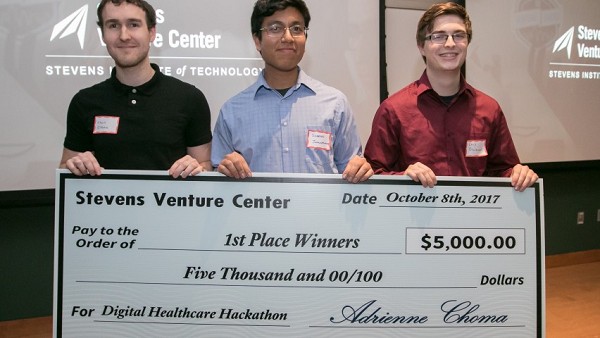At Stevens Hackathon, Students and Community Come Together to Solve Digital Healthcare Challenges

The Stevens Venture Center (SVC) held its first hackathon on October 6-8, and it was a hackathon with a purpose. The Digital Healthcare Hackathon was designed to bring together the community, tech students and budding entrepreneurs to solve critical challenges in medicine.
Participants could work in one of two areas: digital solutions for improving medication compliance or telemonitoring/telehealth solutions for improving patient access to diagnosis or treatment.
The first-place winner was Team Ethyl, which was awarded $5,000. The members included Chris Blackwood and Ryan O’Shea, both Stevens students; and Sharan Juangphanich, an electrical engineer at Canary Connect, a New York startup offering a connected security solution.
The Ethyl team proposed a wrist-worn device for former substance abusers that allows a community of friends and other former abusers to help track and support the wearer during the recovery process.
The idea for the hackathon came from Stevens alum Premal Kamdar, a 2013 engineering graduate who recently completed a digital health innovation fellowship at the Texas Medical Center, in Houston. “We worked together for eight months to make this happen,” said Adrienne Choma, director of the SVC, in an interview.
Choma noted that this was the first time Stevens had opened the SVC to members of the community and students from other colleges. “We advertised all over the place for applicants. We had 130 applicants for 50 slots.” She said that they had kept the participants to 50 so they could form ten teams of two to five people.
The hackathon culminated in a pitch competition, in which the teams presented their ideas to a panel of judges that evaluated their technological and business viability and awarded a total of $10,000 in prizes. “We knew we wanted to do the presentations on Sunday evening. If we had a larger number of teams, it would become unwieldy.”
The hackathon organizers wanted the teams to reflect “a good balance of Stevens students, students from other universities, business people and healthcare professionals. We were after a good mix on each team,” Choma said.
The second-place winner, Team Lux, proposed an application to help patients adhere to a medication regimen. That team was made up of four Stevens undergraduate students,Zachary Caldarola, Lucas Gallo,Nicole Fosko and Melissa Vicino; as well asChandler Maskal, a graduate student Rensselaer Polytechnic Institute, who had interned at Booz Allen and Johnson & Johnson.
Team Diagnose.me, consisting of Stevens undergraduates Matthew Sabatini and Mike Wezyk, won third place for a planned platform that uses machine learning to accurately diagnose patients based on demographics and personal health information.
Another team, My72, consisting of all Stevens students didn’t place among the winners, but is putting together a company, finalizing development and planning to join the SVC, Choma noted.
The proposed company will seek to ensure efficient diagnoses by providing healthcare solutions and drug-effect analytics. The team has an advanced physical sensor system that can monitor critical conditions and deliver expert care remotely via push notifications to the doctor, along with feedback about the patient’s condition. This system could enhance patient experience by making effective medical care possible in the comfort of the patient’s own home. It also enables doctors to prioritize their time for the patients who need them the most.
The team included freshmen Daniel Gulko andJoshua Schmidt and graduate students Krishanu Agrawal, Ankita Narayan andChristina Eng. “I’m really pleased that there were freshman on the team because it exposed them to learning entrepreneurship early in their careers at Stevens, which is one of our objectives,” said Choma.
The hackathon participants attended workshops on development and prototyping, big data and healthcare, pitching business ideas and raising seed capital. They also spent hours in a series of hacking sessions in which teams worked to solve a specific healthcare issue.
The weekend included a dinner attended by about 100 people, as well as a keynote address by Paul von Autenried, senior vice president and CIO at Bristol-Myers Squibb (New York), and a kickoff speech by Jarrett G. Bauer, the CEO of Hoboken-based Health Recovery Solutions. Donald Lombardi, associate professor at the Stevens School of Business, served as the master of ceremonies.
Choma organized the hackathon with Kamdar and his brother Vishal Kamdar, an analyst at the investment banking firm Evercore (New York). The group behind the event also included Stevens undergraduates Austin Cawley-Edwards and Francesca Bueti, and Mukund Iyengar, assistant professor and entrepreneur in residence in the Department of Electrical and Computer Engineering.
In addition, nine organizations signed on as sponsors: Bristol-Myers Squibb, CarePoint Health (Bayonne), Gibbons P.C. (Newark), Greenberg Traurig (Florham Park), Hackensack Meridian Health (Edison), Health Recovery Solutions, Lowenstein Sandler (Roseland), New Jersey Innovation Institute (Newark) and Quest Diagnostics (Secaucus).
Up next for the SVC is more community involvement. “I’m looking for ways to get Stevens involved with more community companies and the overall community in New Jersey,” Choma said. “We are planning another event in January that we are calling ‘LaunchPad.’ LaunchPad is a program we started last year. It’s similar to a hackathon but it is a business-planning weekend. Last year, we had five teams that got together and came up with a business plan for a company, and two of them actually went on to start companies.”
In 2018, rather than just use ideas that are internally generated, Stevens will reach out to other organizations for real-world ideas. “I often get calls from community companies or alumni that have ideas. They want to start a business. They need technical people to implement it, whether it is mechanical engineers or programmers. We are setting up a program where we will prescreen people to come in and form teams with our students.” These companies will have to commit to working with the students for at least a year and provide them with compensation and some equity.

